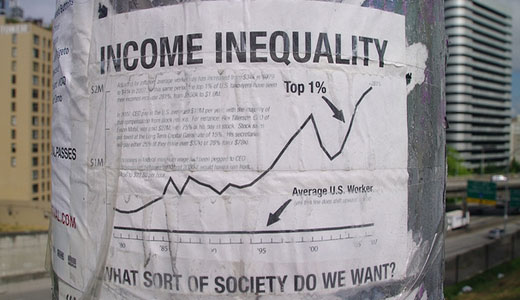
Joseph Stiglitz, a Nobel prize winner in economics, views growing inequality (a Marxist might say “the growing class divide”) as a threat that may block economic recovery from our “Lesser Depression.” In other words, it’s possible that the “Lesser Depression” might yet become the “Greater Depression.” The news that our country’s GDP (gross domestic product) has declined again makes this threat more than just speculation.
Stiglitz writes, “Politicians typically talk about rising inequality and the sluggish recovery as separate phenomena, when they are in fact intertwined. Inequality stifles, restrains, and holds back our growth. When even the free-market-oriented magazine The Economist argues – as it did in a special feature in October – that the magnitude and nature of the country’s inequality represent a serious threat to America, we should know that something has gone horribly wrong. And yet, after four decades of widening inequality and the greatest economic downturn since the Depression, we haven’t done anything about it.”
Stiglitz cites four principal causes of the growing class divide.
First, the working class, broadly defined, is too weak economically to support the consumer spending that has historically driven economic growth.
Second, the hollowing out of the “middle class” since the 1970s means that working people are unable to invest in their future by educating themselves and their children.
Third, stagnating working class incomes are holding back tax revenues. The recent modest agreement to restore tax rates for incomes over $400,000 did very little to change this, considering the multitude of tax breaks for corporations and the rich that remain. Further, investment income from Wall Street speculation is still taxed at a far lower rate than wages. Regressive taxes mean that vital investments in infrastructure, education, research and health that are crucial for restoring long-term economic strength go wanting.
Fourth, inequality is strongly associated with more frequent and more severe boom-and-bust cycles that make our economy more volatile, vulnerable, and likely to generate political instability.
Economist Paul Krugman is a bit more cautious about the direct impact of inequality on the recovery. He notes that economics “is not a morality play” and that a market economy could reach “equilibrium,” and you could have virtually full employment based on purchases of yachts, luxury cars, and the services of personal trainers and celebrity chefs. The returns from rising productivity can go, and indeed have been going, ever more to the rich – not to those who do the producing! A democratic society with a political interest in fairness might not like such an economy, but there is little economic evidence that this would not be possible.
But there are “equilibriums” and then there are sustainable equilibriums. The scenario Krugman describes is clearly unsustainable.
Solutions
Beyond this theoretical debate, what are real solutions? I can only think of three ways – plus the obvious fourth – to redistribute wealth on the scale that fairness requires.
1) More progressive taxation to pay for investment in health care, education, security, a clean environment, roads, bridges, green energy and transport. These are public goods. They constitute a substantial portion of social wealth. In addition, most intellectual property – for example, biomedical and technology innovations – are also inherently quasi–public goods – because they exist in people’s heads or in a form that can be easily and cheaply copied. Public goods will be the principal sources of wealth in the society that successfully emerges from this depression with democracy intact.
2) Provide for national collective bargaining. For example: Mandate collective bargaining for everyone over two things: the employer’s minimum wage, and employee safety. Skip the entire embattled union certification/election process. A workplace organization, or any section of it, can affiliate with a labor federation, or not. End of the “right-to-work” debate, since there is no longer any threat of “decertification.” This is analogous to the approach Brazil’s former president Lula took to reviving labor law in that country after the military dictatorship. It united organized and unorganized workers in a demand that did not rely on any trickle-down theory to promise gains to multitudes of workers in real time.
3) Enact new laws protecting and expanding the value of “human capital.” Human capital represents the education, accumulated know-how, training and other “tools” that an employee brings to an enterprise. The good–paying jobs of the future will be jobs where the “human capital” investment is large. Hourly wage- or salary–based compensation cannot generally retrieve the full value of “human capital” inputs. In the high tech boom, employees with stock or other capital options were one of the few income pluses in the 1990s, offsetting the longstanding stagnation of U.S. working class income. Yet this kind of income is not regulated, and many workers were literally robbed and fleeced of promised wealth in spite of their Herculean efforts for their employers.
And the obvious fourth option:
4) Nationalize the “too big to fail” companies – then we won’t have to worry about taxing them fairly.
Any one of these four is the equivalent to a social revolution. Time to think anew.
Photo: mSeattle/Flickr












Comments